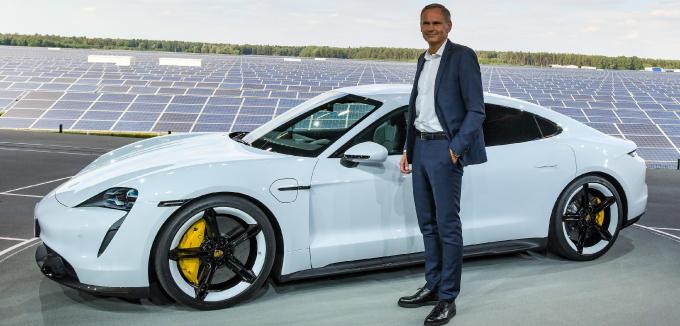Volkswagen and IG Metall have brought their negotiations for Volkswagen AG employees covered by the company collective agreement to a successful conclusion. As a result of the coronavirus crisis, the negotiations took place under extremely difficult conditions. The parties agreed that the pay agreement, which had been terminated with effect from April 30, 2020, should… Continue reading @VW Group: Volkswagen and IG Metall successfully complete pay negotiations
Tag: VW
@VW Group: Volkswagen Group China: Clear signs of business recovery
Volkswagen Group China’s operations are showing clear signs of business recovery. All 2,000 Volkswagen brand dealerships are now open again, with showroom traffic during the last weekend of March comparable to the same period last year. Over 95% of the dealerships of the other locally producing brands Audi and ŠKODA have also reopened. The SAIC… Continue reading @VW Group: Volkswagen Group China: Clear signs of business recovery
Press Releases – Corona crisis: almost 1.5 million vehicles in production losses for European auto makers
Brussels, 9 April 2020 – Factory shutdowns as a result of the COVID-19 crisis have resulted in lost production amounting to 1,465,415 motor vehicles to date, according to new figures published by the European Automobile Manufacturers’ Association (ACEA). This figure – covering passenger cars, trucks, vans, buses and coaches – is up from 1.2 million… Continue reading Press Releases – Corona crisis: almost 1.5 million vehicles in production losses for European auto makers
VW Considers Options for Record $3.6 Billion Dividend
Volkswagen AG is considering whether to pay out a record 3.3 billion-euro ($3.6 billion) dividend as planned, or use at least part of it to shore up its finances for what is shaping up to be the biggest economic crisis since World War II.
@VW Group: Clear rules to protect employees
For the resumption of production at Volkswagen, health takes priority over speed. For this reason, company management and the General Works Council have laid down clear rules and measures for the protection of employees in a works agreement. Volkswagen HR Board Member Gunnar Kilian says: “We are taking comprehensive precautions so that our employees can… Continue reading @VW Group: Clear rules to protect employees
@VW Group: Corona pandemic: Volkswagen donates one million euros for immediate aid and emergency relief in refugee camps
The Volkswagen Group is donating one million euros for immediate aid and emergency relief for refugees in Syria, Turkey and Greece menaced by the corona pandemic. The funds will be given to the German Red Cross (DRK), which is organizing and implementing support locally together with the national Red Cross and Red Crescent organizations. Volkswagen… Continue reading @VW Group: Corona pandemic: Volkswagen donates one million euros for immediate aid and emergency relief in refugee camps
@VW Group: Flexible quick charging stations launch in China
Volkswagen Group Components and the start-up Shanghai DU-POWER New Energy Technical Co., Ltd. plan to work together to produce flexible quick charging stations in China. An agreement to this effect was signed by representatives from both companies in Suzhou, China. Series production of the flexible quick charging stations is currently scheduled to start in the… Continue reading @VW Group: Flexible quick charging stations launch in China
@VW Group: Porsche gives employees a voluntary bonus in the success year 2019
The Porsche Newsroom is a service provided by the Porsche Communication for journalists, bloggers and the online community. © 2020 Dr. Ing. h.c. F. Porsche AG * Data determined in accordance with the measurement method required by law. Since 1 September 2017 certain new cars have been type approved in accordance with the Worldwide Harmonised Light… Continue reading @VW Group: Porsche gives employees a voluntary bonus in the success year 2019
Employees should donate part of the bonus: Porsche pays each employee a bonus of 9,000 euros
DPA Porsche CEO Oliver Blume: “Employees are encouraged to donate to non-profit organizations on a voluntary basis” The sports car maker Porsche Show stock market chart Pays its employees a bonus of € 9,000 each for their work in the past year 2019 as agreed – but calls on the employees to voluntarily donate something… Continue reading Employees should donate part of the bonus: Porsche pays each employee a bonus of 9,000 euros
Car maker: unrest at Daimler: Management Board wants to merge financial organizations
Daimler headquarters in Stuttgart Of all things in the corona crisis, the chief financial officer unsettled his team with an organizational reorganization, according to the company. (Photo: AFP) Munich For Daimler– Chief Financial Officer Harald Wilhelm April 1, 2020 is a special date. Finally the former celebrated airbus-Manager at the beginning of the month not… Continue reading Car maker: unrest at Daimler: Management Board wants to merge financial organizations
